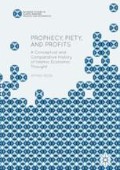Abstract
This chapter explores the rich tradition of Christian economic thought on the subject of scarcity and abundance. This tradition includes the scripture of the Old and New Testaments, the writings of the early Church Fathers and the medieval Scholastics, the modern Papal encyclicals, and the opinions of contemporary Christian theologians and economists. The predominant Christian position on the subject is largely derivative of the concept of stewardship, and its implications with respect to property and freedom.
Access this chapter
Tax calculation will be finalised at checkout
Purchases are for personal use only
Notes
- 1.
See Lv. 26:3–12; Dt. 6:3; 7:12–15; 28:1–14; 30:1–20; Am. 8:4–12; Jr. 34:12–22.
- 2.
Other translations of Matthew, such as the Authorized King James Version, adopt a stronger tone, substituting “do not be anxious” with “take no thought.”
- 3.
While Chrysostom’s ideal of communism does remind us of Plato ’s ideal city-state, it is important to note that “Plato’s principle has a philosophical basis rather than a religious one, unlike Chrysostom’s, and its extent is narrow [city-state], not worldwide as Chrysostom’s” (Karayiannis 1994, 61).
- 4.
See Cohen (2000) for a remarkable critique of the scientific theory of socialism.
References
Barrera, Albino. 2005. God and the Evil of Scarcity: Moral Foundations of Economic Agency. Notre Dame: University of Notre Dame Press.
———. 2006. Wealth as Abundance and Scarcity. In Rediscovering Abundance, ed. Helen Alford et al. Notre Dame: University of Notre Dame Press.
———. 2000. If You’re an Egalitarian, How Come You’re so Rich? Cambridge: Harvard University Press.
Dudden, F. Homes. 1935. The Life and Times of St. Ambrose. Oxford: Clarendon Press.
Gordon, Barry. 1975. Economic Analysis Before Adam Smith: Hesiod to Lessius. New York: Harper and Row Publishers, Inc.
———. 1987. Biblical and Early Judeo-Christian Thought: Genesis to Augustine. In Pre-classical Economic Thought, ed. S. Todd Lowry. Boston: Kluwer Academic Publishers.
———. 1989. The Economic Problem in Biblical and Patristic Thought. London/New York: E. J. Brill.
Haughey, John C. 2006. A Pauline Catechesis of Abundance. In Rediscovering Abundance, ed. Helen Alford et al. Notre Dame: University of Notre Dame Press.
Jeitschko, Thomas, and Rowena Pecchenino. 2008. Review of “Economic Compulsion and Christian Ethics: New Studies in Christian Ethics” and “God and the Evil of Scarcity: Moral Foundations of Economic Agency”. Review of Social Economy 66 (3): 397–402.
Karayiannis, Anastassios D. 1994. The Eastern Christian Fathers (A.D. 350–400) on the Redistribution of Wealth. History of Political Economy 26 (1): 39–67.
Kennedy, Robert G. 2006. Wealth Creation Within the Catholic Social Tradition. In Rediscovering Abundance, ed. Helen Alford et al. Notre Dame: University of Notre Dame Press.
Long, D. Stephen. 2000. Divine Economy: Theology and the Market. London: Routledge.
Mathewes, Charles. 2004. On Using the World. In Having: Property and Possessions in Religious and Social Life, ed. William Schweiker and Charles Mathewes. Grand Rapids: Eerdmans Publishing.
Richardson, Alan. 1958. The Biblical Doctrine of Work. London: S.C.M.
Robbins, Lionel. 1952. An Essay on the Nature and Significance of Economic Science. London: Macmillan.
Spiegel, Hnery W. 2004. The Growth of Economic Thought. London: Duke University Press.
Wood, Diana. 2002. Medieval Economic Thought. Cambridge: Cambridge University Press.
Author information
Authors and Affiliations
Copyright information
© 2018 The Author(s)
About this chapter
Cite this chapter
Reda, A. (2018). Abundance and Scarcity: Christian Economic Thought. In: Prophecy, Piety, and Profits. Palgrave Studies in Islamic Banking, Finance, and Economics. Palgrave Macmillan, New York. https://doi.org/10.1057/978-1-137-56825-0_3
Download citation
DOI: https://doi.org/10.1057/978-1-137-56825-0_3
Published:
Publisher Name: Palgrave Macmillan, New York
Print ISBN: 978-1-137-56824-3
Online ISBN: 978-1-137-56825-0
eBook Packages: Economics and FinanceEconomics and Finance (R0)

